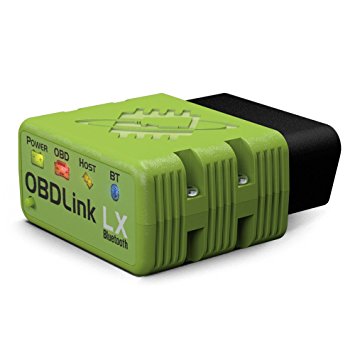OBDLink LX
Identification
>AT I
ELM327 v1.3a
>AT @1
SCANTOOL.NET LLC
>STDI
OBDLink LX BT r1.2
>STI
STN1155 v4.0.0
>AT RV
13.4V
Connecting to an OBDLink LX from Linux
the following was tested on a Raspberry PI
Bluetooth pairing with bluetoothctl
bluetoothctl
agent on
scan on
Discovery started
...
[NEW] Device 00:04:3E:9F:A3:C0 OBDLink LX
pair 00:04:3E:9F:A3:C0
Attempting to pair with 00:04:3E:9F:A3:C0
[CHG] Device 00:04:3E:9F:A3:C0 Class: 0x020300
[CHG] Device 00:04:3E:9F:A3:C0 Icon: network-wireless
[CHG] Device 00:04:3E:9F:A3:C0 Connected: yes
Request confirmation
[agent] Confirm passkey 559460 (yes/no): yes
[CHG] Device 00:04:3E:9F:A3:C0 UUIDs:
00001101-0000-1000-8000-00805f9b34fb
[CHG] Device 00:04:3E:9F:A3:C0 Paired: yes
Pairing successful
[CHG] Device 00:04:3E:9F:A3:C0 Trusted: yes
Changing 00:04:3E:9F:A3:C0 trust succeeded
quit
Setting up an rfcomm device
sudo rfcomm bind rfcomm0 00:04:3E:9F:A3:C0
ls -l /dev/rfcomm0
crw-rw---- 1 root dialout 216, 0 Jun 21 21:41 /dev/rfcomm0
Testing
minicom -D /dev/rfcomm0 115200
Testing with a python script
python3 source/java/can4eve/scripts/obdtest.py
>K
>LM327 v1.3a
>KE0
OK
>
ELM327 v1.3a
>
OK
>
ISO 15765-4 (CAN 11/500)
>
OK
>
OK
>
OK
>
Forwarding the OBDII Adapter via TCP/IP
python source/java/can4eve/scripts/tcp_serial_redirect.py --debug -P 7000 /dev/rfcomm0 115200
--- TCP/IP to Serial redirect on /dev/rfcomm0 115200,8,N,1 ---
--- type Ctrl-C / BREAK to quit
Waiting for connection on 7000...
At this point your OBDLink LX is available via LAN - you can simply do a telnet host 7000 to the server where you ran the commands. The can4eve software can now use the bluetooth device as if it was a Wifi/LAN device
